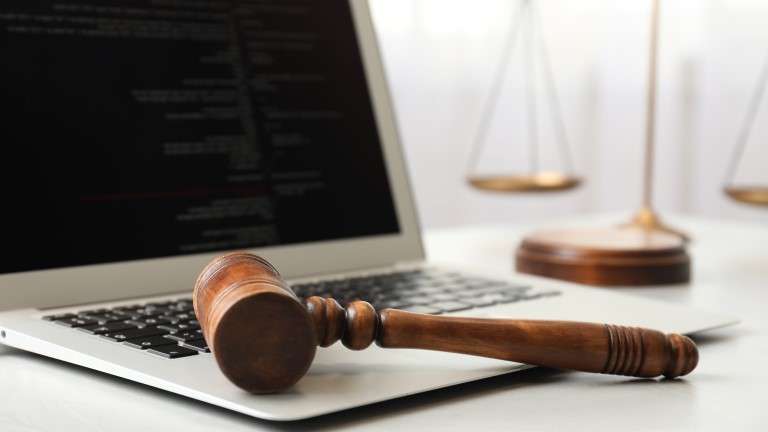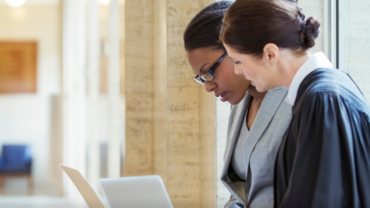The COVID-19 pandemic has brought about significant and lasting change to court operations, most importantly by expediting courts' adoption of modern technology
Prior to the pandemic, court proceedings — such as conferences, hearings, and trials — often occurred as in-person events and, in limited instances, by telephone. As a result of the pandemic-era urgency to modernize operations, however, courts responded by conducting many proceedings remotely, often by videoconference.
This has allowed courts, litigants, and others to recreate the environment of a face-to-face court proceeding, with the added benefit of efficiency for all and improved access to justice for citizens.
Key considerations for courts
Of course, there are several key considerations that courts need to address as they continue to pivot towards conducting proceedings remotely.
What does a fully remote or hybrid proceeding entail?
In a remote proceeding, the judge, attorneys, clients, witnesses, and other participants can appear from multiple locations. By contrast, a hybrid proceeding involves some participants — often a witness — appearing remotely, while others are present in the courtroom with the judge. In either of these proceeding types, participants must have access to the specific remote technology used by the court, which frequently involves Zoom videoconferencing. While videoconferencing typically serves as a primary method for conducting a remote proceeding, a telephone backup ensures that the proceeding can continue to take place even if technical difficulties arise.
Courts may utilize different features for the videoconferencing platform as well. For example, one of Zoom’s standard features involves a private breakout room, which allows attorneys and their clients to privately communicate with each other through the Zoom platform. However, Idaho state courts disabled Zoom’s private chat feature for participants and instead require them to communicate outside of Zoom, such as by telephone.
The judge and court staff remain in control over a remote proceeding and, for example, can employ the mute feature to silence any disruptive participants.
How do the courts determine which proceedings will occur remotely?
Concurrent with rolling back orders and directives governing the pandemic, several courts have established procedures, orders, and rules addressing the specific circumstances for remote and hybrid proceedings. These proceedings vary among state and federal courts and the type of court proceeding.
What are advantages to remote proceedings?
Remote proceedings help limit litigation costs, by eliminating attorneys’ travel time and any waiting time at the courthouse. Remote proceedings also allow a party to present testimony from witnesses who may not be able to attend in person. For example, a key witness may be unable to attend in person because of their location, financial condition, or health, yet the witness may be able to participate remotely.
Courts usually can handle many matters remotely with the same effectiveness as in-person proceedings, such as holding status conferences or motion hearings that may involve non-evidentiary or procedural matters. Remote proceedings also provide flexibility for courts in scheduling proceedings when an in-person proceeding is impossible, because of a lack of available courtrooms, for example. Remote proceedings also promote public access to the courts by allowing additional viewing through livestream or recordings.
What are disadvantages to remote proceedings?
Remote proceedings may not be an effective substitute for an in-person proceeding, however. Assessing the effectiveness and credibility of a testimony requires being able to observe a witness’s demeanor, which may be impossible, limited, or even appear unnatural when captured by camera in a remote setting. Likewise, presenting exhibits can involve unique problems in a remote proceedings, requiring an ability to use the “share screen” feature and multi-tasking between sharing or reviewing displayed exhibits. If a problem arises, the effectiveness of testimony exhibits may be lost, especially if participants are forced to use a dial-in number or hold exhibits up to the camera.
Remote proceedings also restrict the ability for counsel to confer with their clients in confidence. During a proceeding, counsel and their clients oftentimes communicate by whispering or passing notes. However, a remote proceeding requires having an ability to communicate through a breakout room, texting, or otherwise, but without the appearance of distraction or improper coaching.
Further, a remote proceeding requires that the participants have technical capacity and competency. This includes having a reliable internet connection, a compatible computer, familiarity with the videoconferencing platform, and a backup plan — such as a smartphone app or dial-in number — if connectivity issues arise.
What safeguards are necessary for remote proceedings?
As with in-person proceedings, remote proceedings must comply with applicable procedural requirements, including any constitutional and statutory rights, such as constitutional due process. Additional safeguards may be necessary so that participants can have an ability to meaningfully participate, including if a participant (especially a self-represented party) cannot use a videoconferencing platform.
As a result, courts may need to facilitate access to remote proceedings by providing instructions, verifying the ability of litigants to participate, having a backup if technology fails, or holding a proceeding in-person when all else fails. Indeed, many courts, such as the US District Court for the Western District of Texas, provide detailed guidance for using Zoom, while others, like the Massachusetts Trial Courts, provide Zoom Rooms to accommodate litigants.
You can find out more about remote court proceedings here.







